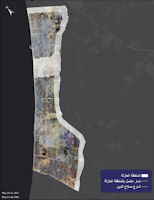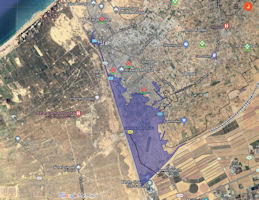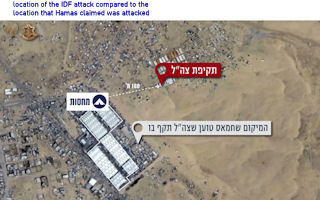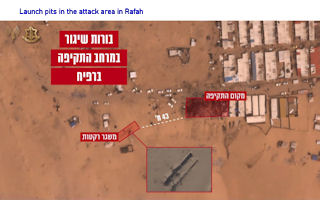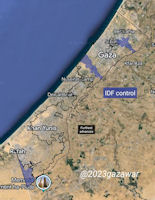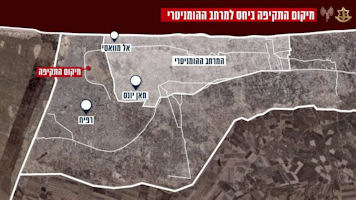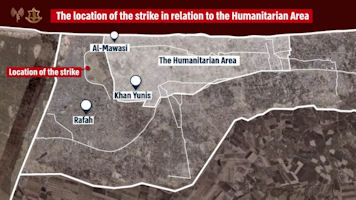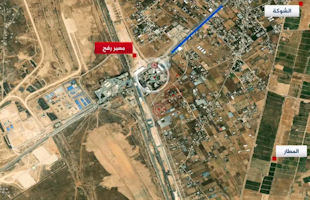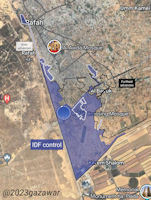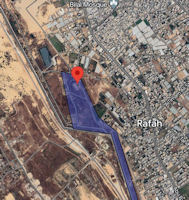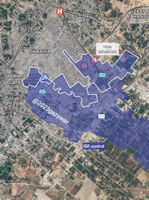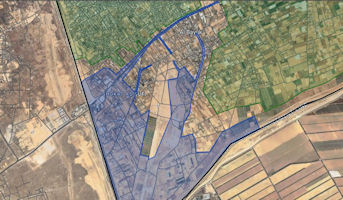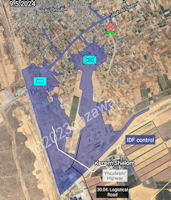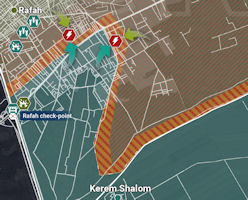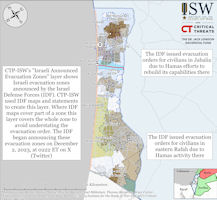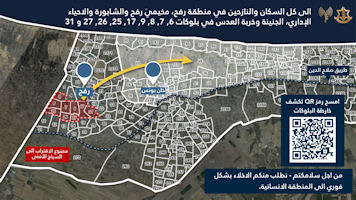Operation Iron Swords - Day 237 - 30 May 2024
“At any point, Hamas could have ended this burgeoning tragedy to
surrender and release every hostage. …
Hamas instigated and owns this humanitarian catastrophe.”
Sen. John Fetterman (D-PA)
Contents |
|
NEW - War Termination NEW - Operations NEW - Operations - Gaza NEW - Operations - Judea-Samaria NEW - Operations - Lebanon NEW - Operations - Syria / Iraq NEW - Operations - Yemen UPDATED - Operations Maps NEW - By-Standers NEW - Axis of Resistance NEW - Allied for Democracy UPDATED - By the Numbers |
Benny Gantz's party, a member of the Israeli war government, announced on Thursday that it had submitted a draft law to dissolve the Knesset and hold early elections. He said in a statement, “The head of the State Camp, MK Panina Tamno Sheta, submitted a draft law to dissolve the 25th Knesset, in continuation of the step led by the head of the State Camp, Minister Benny Gantz, to reach elections with broad consensus before October, one year after the massacre.”
Gantz had given the war government until June 8 to announce what he called “a clear national strategy regarding the war in the Gaza Strip and the tension on the northern front.” In a press conference a few days ago, Gantz called on the war government to approve a 6-point plan for the conflict in Gaza by June 8. He threatened that if his expectations were not met, he would withdraw his centrist party from the war government headed by Benjamin Netanyahu. “Our army has been waging an existential war since October 7,” Gantz said, stressing that “victory in Gaza has not been achieved yet.”
Gantz added, "We must work to return our citizens to the north by next September." He sent a message to Netanyahu, saying that the decision was in his hands. Gantz accused a section of politicians of lacking responsibility and caring for their personal interests. Gantz added, "Israel's ship is heading toward the rocks because of personal considerations that have taken control of the country's leadership." He also called for a better recruitment law for ultra-Orthodox Jews that is in line with the requirements of the current stage.
Before that, Gantz and Israeli Defense Minister Yoav Galant criticized Netanyahu for not having a plan for who would rule Gaza after the war. During the past few days, angry demonstrations were held in Tel Aviv, organized by relatives and supporters of Israeli hostages who were held hostage by Hamas militants in Gaza in the October 7 attacks, and the demonstrators demanded their release.
The Likud party responded to the bill: "In the midst of a war, Israel needs unity and not division. The dissolution of the unity government is a reward for Sinvar, a surrender to international pressure and a fatal blow to the efforts to free our hostages."
Minister Gadi Eisenkot said yesterday at the Meir Dagan conference on security and strategy, that Israel must go to elections this fall : "between September and December". According to him, "This is important for building trust. The tree walk in Gaza will end within weeks, and then an agreed election date should be set, and if not - do everything to bring about the elections in a democratic way as early as possible."
"The decision to enter the government was clear," said the minister. "But the length of stay and departure are more complex things, because when you are inside you understand the full picture in Gaza, Lebanon, Judea and Samaria, Syria, Iraq, Yemen and especially Iran." However, he said, "I cannot ignore the fact that recently our influence has diminished. Political and other considerations also entered into the decisions that we voted on mainly in chambers."
Likud responded to Eisenkot's words and said: "Eisenkot and Gantz are looking for excuses to end the war without achieving its goals, and to withdraw from the government in the midst of the war. Instead of engaging in the pursuit of victory, they are engaged in petty politics." In the state camp they replied: "Instead of leading to achievements following the maneuvering on the battlefield, Netanyahu is maneuvering between political landmines and refraining from making decisions for the sake of the country. You don't win wars with slogans."
Gantz called on Netanyahu in April to go to the elections within six months. "On the anniversary of the war, we must return to the people and ask for their trust," Gantz explained at a press conference. He also said "what is happening in the corridors of government, in the networks, in the streets, is dangerous, and must be stopped." The Likud party accused Gantz after his speech of engaging in "petty politics".
The chairman of the "Israel Beitno" party, Avigdor Lieberman, is holding a political dialogue with former Prime Minister Naftali Bennett, with the aim of bringing about a political union that could serve as a "governing alternative" to Likud and Prime Minister Benjamin Netanyahu. This was published for the first time today (Thursday) in the evening news at Khan 11.
Lieberman is interested in a broad union of party leaders on the right, who oppose Netanyahu and are interested in changing the government. He wants Bennett to join him in a joint list, when he is at the head of it. The "Israel Beitno" party said: "There are no proposals, everything is rumours. Naturally, everyone is talking to everyone, there is nothing currently on the table. Lieberman is engaged and active these days only in creating a governing alternative and organizing properly in order to overthrow the government."
Officials in "Israel Beitno" and "Tikva Hadasha" today confirmed news here that talks are taking place between them about the possibility of running together in the upcoming elections. In the program this morning on the B network, it was announced that the parties said that the talks are still not concrete because there is no date for the elections, but they explained that these kinds of talks take time, and that is why the talks have begun.
Sources in the opposition said this week that in Beish Atid, in Israel our home and the state right (the faction that represents Tikva Hadesh) a decision was made to step up the moves and attempts to overthrow the government and combine arms between the various factions for this purpose.
War Termination
The terrorist organization Hamas announced this evening (Thursday) that it will not advance in negotiations for the release of hostages until Israel stops the war. Even earlier in Israel, it was estimated that Hamas was not interested in moving forward at this stage in negotiations for a deal to release the hostages, and that it would reject the Israeli position that was put before the mediators - this was published this evening in the evening news here 11 from several sources familiar with the negotiations. In the meantime, tonight the political-security cabinet will meet and discuss, among other things, the negotiations and the continuation of the operation in Rafah.
In Israel, they explain that several processes are taking place that will lead Hamas to postpone contacts at this stage - the international pressure on Israel and the recognition of a Palestinian state by several countries in the world, the imminent dissolution of the War Cabinet, the strained relations between Washington and Jerusalem, as well as continued flexibility on the part of Israel in every proposal previously submitted to Hamas. In the evening news at Kan 11 it was reported that Israel expects Qatar to put pressure on Hamas, in order to move forward in the talks between the parties. Yesterday, Qatar presented the Israeli position to Hamas, which includes flexibility in terms of the number of abductees to be released in the first phase, which is defined as humanitarian.
In the Saudi newspaper Al-Sharq, it was published earlier today by senior Hamas officials that they did indeed reject the Israeli offer to return to contacts. According to the report, a senior member of the terrorist organization said that they refuse to return to negotiations before stopping the war. It was also reported that the mediators received a new Israeli proposal, but Hamas announced that they rejected it outright. In the meantime, the Islamic Jihad published another video today of the abducted Alexander Trupanov , in which he says that his condition is good.
Here in the news it was reported yesterday that the Israeli proposal for a deal to release hostages was officially forwarded to mediators and in Israel they are waiting for an answer from Qatar on the question of Hamas' willingness to continue negotiations based on the proposal. The document that was forwarded to the mediators presents the Israeli position on the outline of a hostage deal and according to sources, it expresses a willingness to be flexible regarding the number of hostages to be released in the first phase, which is defined as the "humanitarian" phase.
The head of the National Assembly, Tzachi Hanegbi, who is in Cyprus as part of a delegation dealing with the issue of the abductees, said yesterday: "We are meeting with the families and talking with them, it is a nightmare that cannot even be imagined, it is hard for us to understand the intensity of the nightmare that the families are experiencing. There are 125 people we need to bring home, we deal with this every day." In this news it was reported two days ago that a dispute emerged between the members of the war cabinet regarding Hamas's demand for an end to the war. Some ministers believe that this section can be negotiated, but Prime Minister Netanyahu and his entourage continue to claim that agreeing to the demand is surrendering to Hamas.
As the war between Israel and Hamas continues for about 8 months, questions arise about when and how it will end, and the expected scenarios for governing the Gaza Strip after the war. Israeli media outlets, including Haaretz, highlight the importance of answering such questions to determine the features of the future.
There will be more incidents and mistakes, such as targeting World Central Kitchen employees or United Nations humanitarian employees, more international court rulings against Israel, and more diplomatic isolation, if Netanyahu does not have answers to those questions, according to “ Haaretz .” Israeli political analyst, Joab Stern, confirms that Netanyahu "indeed does not have answers to these questions" and therefore he "refuses to answer them." Netanyahu "does not like to make major or strategic decisions," but rather "takes decisions and small steps forward," according to Stern's interview with Al-Hurra website.
But on the other hand, Israeli political analyst Eddie Cohen describes Haaretz's proposal as very left-wing and that it is "against the right, the government, and Netanyahu." He believes that this proposal is “overly arrogant,” because “no one knows how the war will end,” according to his interview with the Al-Hurra website.
Palestinian political analyst and head of the European Council for International Relations and Consulting, based in Paris, Adel al-Ghoul, stresses that "the war will not end except with an agreement." The agreement will relate to "the release of prisoners and detainees from both parties," after which there will be a "ceasefire," according to his interview with the Al-Hurra website. Al-Ghoul points out that the goal of eliminating Hamas “cannot be achieved,” and after 8 months, “the movement still exists and has the ability to withstand, and has distributed its military effort throughout the past months, and realizes that “the war will last for a long time.” Therefore, the end of the war will be with an “agreement,” because Israel “will not be able to liberate those kidnapped by Hamas,” and releasing those captives “will only happen with a deal,” according to Al-Ghoul.
As for Stern, he talks about scenarios for the end of the Gaza war, which is to end completely through a “big deal.” The war is also likely to continue at a “relatively low pace,” according to the Israeli political analyst. We heard “Israeli officials talking about months of battle,” but it will be “on a relatively small scale,” and therefore “we cannot say that the end of the war is on the horizon,” according to Stern.
On Wednesday, Israeli National Security Advisor Tzachi Hanegbi said that the war against Hamas in the Gaza Strip could continue for “seven more months” to achieve the goal of “eliminating” the Palestinian movement. He added in an interview with the Israeli Public Broadcasting Corporation (Kan), "We may have another seven months of fighting to consolidate our success and achieve our goals, that is, to destroy Hamas's authority and its military capabilities."
For his part, Cohen asserts that the war will end with “the elimination of Hamas, cleansing the Gaza Strip of the movement, and the evacuation of weapons from Gaza,” and after that, “every incident will be new,” Cohen stresses. To talk about the end of the war, “it is necessary to know who the Palestinian leaders are,” and if there are “moderate” figures, they can renew the political diplomatic path, according to the Israeli political analyst.
What happens after the war ends? Netanyahu refuses to answer that question, and believes that “discussing this means accepting the Palestinians’ conditions and the return of Palestinian authority to Gaza,” according to Stern. He points out that “talking about after the war” is one of the things that “Netanyahu wants to prevent,” and for this reason he “refuses to discuss the issue.” Stern believes that "there is no escape from the entry of various elements into Gaza, and the possibility of Hamas taking control of the Strip, even if Netanyahu prevents the return of the Palestinian Authority there." The Israeli political analyst stresses that "chaos in the Gaza Strip is not in Israel's interest."
As for Al-Ghoul, he points out that Israel “does not have a plan for after the war, how to deal with the Gaza Strip, and who will rule the Strip.” He believes that Israel realizes that “there must be an agreement with Arab and international bodies for the presence of security forces to maintain security in the Gaza Strip during the transitional period.” A Palestinian government must be formed that “enjoys international recognition and support because it will supervise the reconstruction of the destroyed Strip,” according to Al-Ghoul.
Stern stresses that “it is not possible to prevent a recurrence of the Hamas attack,” except with “cooperation” between the Israeli and Palestinian parties, and reducing “friction.” But in the current situation, “this cannot happen, because (the friction is great) and Israel seeks to control the Palestinian areas.” Stern believes that Israel “cannot control all the regions continuously because that is (beyond its tolerance and ability).”
For his part, Al-Ghoul points out that the main dilemma after the end of the war relates to "the fate of the Al-Qassam Brigades and other armed factions such as the Al-Quds Brigades." This dilemma can be solved by “establishing an independent Palestinian state and supporting the two-state solution,” according to Al-Ghoul.
The United Nations has long supported the vision of a “two-state solution” living side by side within secure and recognized borders. The Palestinians want to establish a state in the West Bank and Gaza Strip, with East Jerusalem as its capital. The Palestinians are represented by the Palestinian Authority, which exercises "limited self-rule" in the West Bank, and Hamas has run the Gaza Strip since 2007.
Therefore, Al-Ghoul confirms that after the ceasefire there will be “political negotiations that will lead to a two-state solution and the establishment of a Palestinian state whose form will be agreed upon, and which will be responsible for maintaining security in the Gaza Strip,” and thus “all armed brigades will be dissolved and joined the ranks of the Palestinian army.” Therefore, the state will be solely responsible for “border security” between the Palestinian and Israeli states, according to Al-Ghoul.
At the same time, "reforms must be carried out in the Palestinian Authority, fight corruption, and change the government," and there must be a change in the Palestinian leadership itself, and a change in all the leadership of the security services, Al-Ghoul adds. Thus, there will be “comprehensive change” on both sides of the Palestinian and Israeli governments, and thus “there will be a change in the shape of the political map in the region and the war will end irreversibly,” ensuring “security for Israel and peace for the Palestinian people,” according to Al-Ghoul.
But on the other hand, Cohen stresses that talk about “continuing resistance and establishing a Palestinian state with Jerusalem as its capital (will not happen).” In previous statements to Al-Hurra website, an Israeli diplomatic source revealed that the current Israeli government, headed by Benjamin Netanyahu, “ does not support the two-state solution .”
For his part, Stern believes that the current dilemma can be solved by implementing the "two-state solution." Therefore, Israel needs “a new government that presents a clear strategic vision to resolve all contradictions,” according to the Israeli political analyst. The separation between “Israelis and Palestinians” and good neighborliness are important, “but common life is not possible here,” Stern asserts.
Operational Update
“Cairo News”: A high-ranking Egyptian source denies the existence of an agreement between Cairo and Tel Aviv to reopen the Rafah border crossing in southern Gaza. According to what was reported by Cairo News Channel, the high-ranking source confirmed that there is no truth to what some media reported about the existence of an Egyptian-Israeli agreement regarding the reopening of the Rafah crossing. The source stressed that Egypt adheres to the complete Israeli withdrawal from the crossing as a condition for resuming its work.
A high-ranking Egyptian source had stated that Cairo is determined to continue its efforts to support the Palestinians and preserve their historical rights by all possible means. He pointed out that Egypt confirmed its firm position regarding dealing at the Rafah crossing only with Palestinian and international parties, and would not adopt coordination with the Israeli side. He explained that the Egyptian security delegation is intensifying its efforts to reactivate the armistice and prisoner exchange agreement in coordination with Qatar and the United States. He stated that Egypt informed all concerned parties that Israel's insistence on committing massacres and escalation in the Palestinian Rafah weakens the negotiation paths and leads to dire consequences.
According to reports by public broadcaster Kan, Israel has agreed to withdraw its troops from the crossing to facilitate its reopening. Israel and Egypt agreed to reopen the Rafah border crossing in the southern Gaza Strip for humanitarian aid, following pressure from the United States. The crossing had been closed since May 7, when the Israel Defense Forces (IDF) took control of the Gaza side. Egypt had refused to reopen it until it was returned to Palestinian control, to avoid being seen as complicit in the Israeli military operation in Gaza's southernmost city.
According to reports by public broadcaster Kan, Israel has agreed to withdraw its troops from the crossing to facilitate its reopening. Despite efforts to find an international body to manage the crossing, no agency has been found yet. Consequently, Israel has agreed to temporarily allow the border crossing to be controlled by Palestinians from Gaza who have been vetted to ensure they have no ties to Hamas or other terrorist groups.
As military offensive is disturbing the international aid flow, IDF lifts a ban on the sale of food to Gaza from Israel and the West Bank. The Israel Defense Forces (IDF) lifted a ban on the sale of food to Gaza from Israel and the West Bank, according to Palestinian officials, businessmen and international aid workers who spoke to Reuters. The decision comes as the ground offensive continues to disturb the flow of international aid, the United Nations stated on Wednesday. The IDF authorities allowed Gazan traders to resume their purchases from Israeli and Palestinian suppliers of food such as fresh fruit, vegetables and dairy goods in May, days after starting the assault on Rafah, Gaza's southmost city, said the sources.
"Israel phoned Gazan distributors who had been purchasing goods from the West Bank and Israel before the war," the report cited Ayed Abu Ramadan, chair of the Gaza Chamber of Commerce. "It told them it was ready to coordinate the pick-up of goods." The shift marks the first time any goods produced inside Israel or the West Bank have been allowed into Gaza since October 7, highlighted the report.
Asked by Reuters about the resumption of deliveries, Coordinator of Government Activities in the Territories (COGAT) said it was seeking ways to boost humanitarian aid and increase the amount of food for sale in Gaza. "Allowing for the private sector to bring some food into the Gaza Strip is part of those efforts to increase the amount of food that's coming in," said the COGAT spokesperson Shimon Freedman.
Operational Update - Gaza
About a million Palestinians took refuge in Rafah, on the southern end of the Strip, in the wake of the Israeli attacks on most parts of Gaza during the war that has been going on for more than seven months. The United Nations Relief and Works Agency for Refugees (UNRWA) revealed on Thursday that 32,000 people fled the city of Rafah in the southern Gaza Strip during the past two days. Despite international condemnation, the Israeli army, on Thursday, continues its attack on the city of Rafah, where its war with Hamas in the Gaza Strip is focused, after it announced, on Wednesday, control of the Philadelphia axis, the strategic border strip between the Strip and Egypt.
Military expert Colonel Hatem Al-Falahi said that the military confrontations in the city of Rafah , south of the Gaza Strip, began to take different forms, noting that controlling residential areas requires military force that Israel does not currently possess. Al-Falahi added, in an analysis of the military scene in the Gaza Strip, that the resistance factions do not have specific locations so that it can be said that the occupation has overtaken them, explaining that they take their positions according to the circumstances and capabilities available to them.
He pointed out that the resistance is well aware that the occupation forces will advance in more than one axis. Therefore, it is trying to deal with all of these axes in different ways, including appearing behind enemy lines, as he put it. Al-Falahi based his words on the confrontations currently taking place in the Al-Shoka area, which the occupation forces entered 3 weeks ago, and said that these confrontations confirm that the resistance factions are still present and have the ability to move and maneuver.
Regarding the Philadelphia axis , Al-Falahi said that the occupation forces entered the border strip with Egypt, but they will not remain there for a long time because this conflicts with the Egyptian-Israeli peace treaty , adding that Israel is “trying to hand over the Rafah land crossing to the Palestinian Authority according to a plan that may be agreed upon. ” "Arabic." Al-Falahi suggested that the resistance is not using more than 25% of its strength to confront the brigades that Israel sent to Rafah so that it can deal with the 7-month period that the occupation army is talking about.
Israeli National Security Advisor Tzachi Hanegbi warned in an interview with the Israeli Public Broadcasting Corporation (KAN) that the war in Gaza may continue “an additional seven months to enhance our success and achieve our goals, that is, to destroy Hamas’ authority and military capabilities.” He continued, "The fighting in Rafah is not a futile war," reiterating that the goal is to end Hamas' rule in Gaza and prevent it and its allies from attacking Israel.
The forces of the 98th Division destroyed the route of the tunnel from which seven hostages were rescued last week. The underground was destroyed using engineering tools, mine explosions and other technological means by Yalam fighters and this after ruling out any suspicion of the presence of additional abductees in the area. In response to anti-tank fire fired from an UNRA school towards the force, the 12th Brigade's combat team went into action in the school complex where a mosque and a clinic are also located.
The forces of the 98th Division continue to operate in the heart of the Jabalia camp. The combat team of the 7th Brigade located weapons, including Kalashnikov weapons and cartridges, and killed terrorists approaching them by shooting tanks. The 99th Division led by the 679th Brigade Combat Team continue to operate in the center of the Strip, during the last day the forces located a weapons depot in the area.
The forces of Division 162 continue to operate in the Rafah area, in one of the encounters, the combat team of the Givati ??Brigade identified three terrorists who fired at the forces, an Air Force fighter jet attacked and eliminated the terrorists. The combat teams of the Nahal Brigade and the 12th Brigade located in the last day many terrorist infrastructures and means of warfare, including anti-tank positions, tunnel shafts, an ammunition depot, cargoes and more.
In the last day, missiles were fired at Israeli forces in the Jabalia area, the forces identified two terrorists coming out of the building from which the shooting was carried out. Led by the Air Force and the Gaza Division, an aircraft attacked and eliminated the terrorists. In addition, Air Force fighter jets attacked over 50 targets throughout the Strip.
The Israeli army also said that the three soldiers who were announced killed yesterday in Rafah were killed as a result of the explosion of a tunnel hole that was dug in a medical clinic, during their raid and combing of the area. The army confirmed, in a statement, that the site was raided after the Israeli force was exposed to anti-tank missiles from inside an UNRWA school, he said. The army added that its forces found weapons and military equipment, and openings leading to a network of tunnels between the school’s classrooms, according to the statement.
The Israeli army announced the bombing of two tunnels in the Jabalia area in the northern Gaza Strip, from which it said this May it had recovered 7 bodies of Israeli detainees who were held by Palestinian factions in Gaza. The army published a video clip on the “X” platform, which it said “shows the process of bombing the two tunnels in the Jabalia area, from which seven bodies belonging to Israeli detainees were recovered in a previous stop in May.” The army added, "The two tunnels are separate, but they are connected to one system that has now been destroyed."
On Wednesday night, Thursday, the Palestinian Red Crescent Society announced that two of its paramedics were killed in a “direct” strike carried out by the Israeli army on an ambulance belonging to it in western Rafah. In Gaza, the army announced that it had found “about 20 tunnels in the Philadelphia Corridor area,” which it says are used by armed factions in the Strip for smuggling. On Wednesday, the Israeli army said that its forces took control of a buffer zone along the border between the Gaza Strip and Egypt, meaning that Israel effectively controls the entire land border of the Palestinian Strip.
Israeli army spokesman Daniel Hagari said that Hamas used the Philadelphia axis as an “oxygen artery” and to “permanently smuggle weapons into the Gaza Strip.” Hagari added that Israeli forces "found about 20 tunnels in the Philadelphia axis area," including "advanced terrorist infrastructure east of Rafah, 1.5 km long and about 100 meters from the Rafah crossing." However, Egypt denied the existence of tunnels on the border with the Gaza Strip, and a senior Egyptian official accused Israel of “using these allegations to justify the continuation of the Rafah operation and prolonging the war for political purposes,” according to what was reported by the Cairo News Channel, which is close to Egyptian intelligence.
The Philadelphia axis is considered a “buffer zone” and is subject to the peace agreement between Egypt and Israel, but two weeks after the Israeli military operation in the city of Rafah on the Egyptian border, the Israeli army took control of “half of the axis,” according to its assurances to the “Al-Hurra” website, which raised questions about the reasons and repercussions. The 17-kilometre-long axis served as a buffer zone on the Gaza Strip’s border with Egypt, and Israeli forces patrolled it until 2005, when Israel withdrew its forces as part of the disengagement plan from the Gaza Strip.
Despite the strong international condemnation of the Israeli bombing, on Sunday, of a camp for displaced people in Rafah, which according to the Hamas Ministry of Health in Gaza killed 45 people, the Israeli army continues the attack that it began on May 7 on the crowded city in the southern Gaza Strip, with the aim, according to it, of eliminating the last battalions of Hamas. Israel continued its strikes on Rafah in the southern Gaza Strip, despite an order issued by the International Court of Justice to stop attacks on the city, where half of Gaza's 2.3 million people had previously taken refuge. Israeli tanks advanced to the heart of Rafah for the first time on Tuesday, despite the International Court of Justice ordering Israel to stop the attack on the city.
In its ruling issued on Friday, the International Court of Justice said that Israel did not explain how it would maintain the safety of the evacuated Rafah residents and how it would provide them with food, water and medicine. In its ruling, the court also called on Hamas to immediately and unconditionally release the hostages it took on October 7.
The Israeli army continues to ask residents and displaced people to evacuate specific areas of the city of Rafah in the southern Gaza Strip and move towards the “humanitarian area in Al-Mawasi,” amid Palestinian accusations of pushing residents toward “death” and warnings of a “new humanitarian disaster.” On Wednesday, Rafah witnessed strikes and street fighting between the Israeli army and Hamas, the day after Israeli tanks were stationed in the center of the city. The Rafah crossing with Egypt has been closed since the entry of Israeli forces, and the entry of basic humanitarian aid to the residents of the Gaza Strip has almost stopped.
Since the army issued a warning to evacuate the eastern neighborhoods of Rafah on May 6, before its tanks entered, about one million people, according to the United Nations, have fled the city, where more than 1.4 million Palestinians were crowded, most of them displaced from other areas.
Is the military operation still “limited” or has it become “comprehensive”? Questions accompany the “new evacuation” demands directed by the Israeli army to residents of several neighborhoods in different areas of the city of Rafah in the southern Gaza Strip. In Khan Yunis in the southern Gaza Strip, the Palestinian Civil Defense reported that three bodies were recovered from the rubble of a house that was hit by an Israeli bombing. Palestinian health officials said that several people were injured on Wednesday morning by Israeli fire in the eastern region of Rafah, where they said some aid stores caught fire. Residents said that the continuous Israeli bombing during the night destroyed many homes in the area, from which most people fled after Israeli orders to evacuate.
the Al-Qassam Brigades announced that its fighters in the city of Rafah targeted 8 Israeli soldiers with anti-personnel devices, killing and wounding them. This is east of Al-Tanour neighborhood and next to Al-Shouka municipality. The Al-Qassam Brigades announced the targeting of 6 Israeli Merkava tanks with “Al-Yassin 105” shells in the Yabna camp in Rafah in the south, Gaza City and Beit Lahia in the north. It added that its fighters targeted an Israeli force barricaded in a house with a TGB shell, killing and wounding its members in the middle of the Jabalia camp in the northern Gaza Strip.
The Al-Qassam Brigades also announced the targeting of the occupation forces penetrating behind Tal Zorob in the city of Rafah, south of the Gaza Strip, with mortar shells. In Beit Lahia, north of the Gaza Strip, Al-Qassam fighters detonated an explosive device against occupation soldiers riding a tank, leaving them dead and wounded. In the Gaza Strip, Al-Qassam announced the bombing of Kibbutz Nirim with a missile salvo.
For its part, the Al-Quds Brigades - the military wing of the Islamic Jihad Movement - announced that its fighters, west of the city of Rafah, bombed the occupation vehicles and soldiers penetrating the vicinity of Tal Zorob with regular “60-caliber” and heavy-caliber mortar shells. They also, in conjunction with the Al-Qassam Brigades, targeted two Israeli military vehicles with Tandom and RPG shells in the vicinity of Al-Shoka School, east of Rafah.
Al-Quds Brigades said that its fighters bombarded with mortar shells gatherings of occupation soldiers and vehicles in the vicinity of the Al-Abd Jabr area in the Yabna camp, and the Al-Qaws site, south of the city of Rafah. The Al-Quds Brigades showed pictures, which they said were of targeting and bombing of occupation officers and soldiers in the northern Gaza Strip. The Al-Quds Brigades also broadcast pictures that it said were of the bombing of a gathering of occupation soldiers and vehicles penetrating the Al-Taqaddum axis, south of Rafah.
In Rafah , south of the Gaza Strip, Palestinian medical sources reported that 12 Palestinians were killed as a result of the continuous Israeli bombing of the city since dawn today. Al Jazeera's correspondent reported that 19 Palestinians were martyred as a result of the continued Israeli raids and artillery shelling on the city of Rafah since dawn today. He also reported that 9 Palestinians were martyred and others injured when the Israeli occupation forces targeted a house for the Adwan family in Beit Hanoun, north of the Gaza Strip.
The Palestinian Red Crescent said that it evacuated its medical teams from its field hospital in Al-Mawasi due to the continued bombing, an area designated for displaced civilians. The Red Crescent stated that one of its employees, Issam Aqel, was killed in an Israeli air strike on his home in the Bureij refugee camp in the central Gaza Strip. Hamas medics and media said on Wednesday that an Israeli air strike on the nearby city of Khan Yunis killed three people overnight, including Salama Baraka, a former senior police officer in the Gaza Strip.
Malnutrition is widespread in Gaza, with aid deliveries slowing to a trickle. The United Nations said on Wednesday that the amount of humanitarian aid entering the Strip has decreased by two-thirds since Israel began its attack on Rafah this month.
The armed wings of Hamas and Islamic Jihad said that their fighters confronted the Israeli forces with anti-tank shells and mortar bombs, in addition to detonating previously planted explosive devices. The Israeli army said that three soldiers were killed and three others were seriously injured in battles in the southern Gaza Strip on Wednesday. Without mentioning further details. The Israeli public broadcaster, Radio Kan, reported that this happened as a result of an explosive device exploding in a building in Rafah.
Operational Update - Judea-Samaria
In light of the shooting incidents that took place in recent days at settlements near the Seam Fence in the Menashe Brigade, the IDF is increasing its activity in the area between the Seam Fence and Tulkarm. In parallel with the war in Gaza, the Israeli army deployed forces on Thursday in a number of cities in the occupied West Bank after a “car ramming attack” that resulted in the killing of two 20-year-old Israeli soldiers near Nablus.
The Chief of Staff, Lt. Gen. Hartzi Halevi, arrived last night (Wednesday) at the scene of the stampede attack near Nablus in Samaria, in which the late Sergeant Elia Hillel and the late Sergeant Diego Shoisha Hersage, fighters in the Kafir Brigade, fell. The Chief of Staff held a preliminary investigation and assessment of the situation at the point with the commander of the IOS Division, Brigadier General Yaki Dolf, the commander of the Shomron Brigade, Col. Shimon Siso, representatives of the Shin Bet and police and other commanders. The Commander of the Central Command, General Yehuda Fox arrived this morning (Thursday) at the scene of the attack and held a situation assessment with the commanders and fighters operating in the area.
The Israeli Finance Minister, Bezalel Smotrich, said that “Israel” must wage a war in the West Bank, considering that “the establishment of a Palestinian state will lead to the reconstitution of October 7 in the West Bank.” The Israeli Broadcasting Authority said that, against the backdrop of continued shooting attacks from the Tulkarm area towards the settlements, Smotrich , accompanied by a group of local authority heads, visited a number of West Bank settlements today, Thursday, indicating that he will request this evening in the expanded cabinet session to transfer emergency budgets to... Local authorities along the contact line to enhance security.
The Minister of Finance stressed that it was inevitable to launch a decisive blow against what he described as “terrorism,” as he claimed, “to ensure that the settlements in the West Bank do not become like the settlements on the Gaza Strip.” “The security of the settlements here is the security of the entire country,” Smotrich said. Smotrich sent "a message to the neighbors across the fence, in Tulkarm, Nur al-Shams, Qalqilya and others," saying: "We will turn you into destroyed cities, as is the case in the Gaza Strip, if the terrorism you are practicing against the settlements continues," as he put it. He also added, "The message to the Israelis is that if a Palestinian state is created, what happened in the communities surrounding Gaza on October 7 could happen here as well, and this thing will not happen."
Israeli occupation forces raided in the early hours of Thursday several towns and cities across the West Bank, with Palestinian youth confronting the incursions. The IDF stormed the town of Beit Ummar and al-Arroub refugee camp north of al-Khalil early Thursday morning, leading to clashes during which occupation soldiers fired tear gas canisters at Palestinian youths and their homes. Israeli infantry forces also simultaneously stormed the al-Arroub camp and several Palestinian homes in the town of Tafesh, under the pretense of inspection, but ended up vandalizing them. The occupation also continued its raids against the town of Kafr al-Deek.
The occupation forces stormed the cities of Ramallah and al-Bireh, and heavily fired tear gas bombs during their incursion into the center of Ramallah. Occupation military vehicles also advanced toward al-Hisba Street in Ramallah before invading a currency exchange store. In Beit Lahm, the IDF raided the village of Husan but were confronted by Palestinians, triggering clashes against occupation soldiers.
Israeli occupation forces killed a Palestinian youth and injured five others during a raid into the city of al-Bireh in the occupied West Bank, WAFA news agency reported Thursday, citing medical sources. The Palestinian Ministry of Health confirmed in a statement that one Palestinian was killed and five others were injured by live ammunition fired by the Israeli occupation forces during the raid. It identified the martyr as 20-year-old Wajeeh Ramahi, who sustained a critical injury to the head during the Israeli raid and later succumbed to his wounds before being announced dead a few minutes later.
According to WAFA, one Palestinian was shot by Israeli occupation forces in the abdomen and is in moderate to serious condition, while two others were hit in their lower limbs. In the same context, Israeli occupation forces also detained a Palestinian youth during confrontations that broke out with Palestinian residents in al-Bireh following the incursion. The announcement comes after Israeli occupation forces raided in the early hours of Thursday several towns and cities across the occupied West Bank, with Palestinian youth confronting the incursions. The raids followed Israeli media reports about two Israeli soldiers who were killed in a car-ramming operation at the Awarta checkpoint near the West Bank city of Nablus.
Elsewhere in Nablus, Israeli occupation forces stormed the village of Kafr Qalil, south of Nablus, and raided several neighborhoods. Reportedly, occupation forces blocked the Beit Furik checkpoint east of Nablus, as well as the gates at the northern entrance of the town of Huwara south of Nablus, amid a heavy presence of settlers in the area.
Earlier, Israeli media reported that two soldiers were killed in a car-ramming operation at the Awarta checkpoint near the West Bank city of Nablus. The Israeli website Walla! reported that the army deployed air and special forces to pursue the individual who carried out the operation near one of the entrances of Nablus. It is also worth noting that various Israeli platforms mentioned that the individual who carried out the operation "surrendered to the Palestinian security forces in Nablus and has not yet been handed over to the Israeli army."
Resistance operations intensified with the increased systematic Israeli violence against Palestinians in the occupied West Bank and al-Quds, with the number of Palestinian detainees in the region rising to more than 8,875 since October 7. Between 21-27 May, Israeli forces fatally shot and killed 13 Palestinians, among them five children, and injured 35 others, including seven children, as per a recent report by OCHA. Among the fatalities were 12 Palestinians killed in Jenin, along with a 17-year-old boy from Sa’ir village in Al Khalil. He was shot by Israeli forces on May 26 under the pretext of attempting to stab an Israeli soldier at Beit ‘Einun junction on Road 60. The body of the boy has been withheld by the Israeli forces.
Operational Update - Lebanon
Further to the two alerts that were activated about the intrusion of a hostile aircraft in the north of the country, these are false identifications. An alert was activated in the north of the country about the intrusion of a hostile aircraft, the air defense fighters successfully intercepted using the 'Iron Dome' system a suspicious aerial target that crossed from Lebanon, there was no damage and no casualties. A warning of rocket and missile fire was activated in the area of Kfar Giladi for fear of interception fragments falling.
Since the outbreak of the war, Hezbollah has fired more than 3,000 missiles towards Israel, and dozens of settlements whose residents were evacuated have been severely damaged.
Fighter jets attacked two military buildings where terrorists from the terrorist organization Hezbollah were staying in the areas of Khula and Maron al-Ras in southern Lebanon. Earlier today, IDF forces fired to remove a threat in a number of different areas in southern Lebanon. Following the alerts that were activated in the Zerait area, several launches were detected that crossed from Lebanon, there were no casualties.
Following the alert that was activated in the Margaliot area, the air defense fighters successfully intercepted using the 'Iron Dome' system a suspicious aerial target that crossed from Lebanon. In addition, a warning was activated in the Golan Heights region about the intrusion of a hostile aircraft and a cruise missile coming from the east was shot down. In both cases there was no damage and no casualties.
The Lebanese Hezbollah announced this evening that it had targeted 3 important sites belonging to the Israeli army near the Lebanese border, confirming that direct hits had been achieved. Hezbollah confirmed in separate statements that "the Jal al-Alam site, the Ramtha site, and the Zabdin site were targeted." “A combined attack with missiles and drones loaded with bombs and other weapons.” 6 specific operations by “Hezbollah” against Israel today He explained in a statement: “At 5:50 pm on Thursday, May 30, 2024, the Mujahideen of the Islamic Resistance targeted a deployment of enemy soldiers in the vicinity of the Jal al-Alam site with artillery shells and hit it directly.”
He added in a statement: “At 6:25 pm on Thursday, 5/30/2024, the Mujahideen of the Islamic Resistance targeted the Ramtha site in the occupied Lebanese hills of Kafr Shuba with missile weapons and hit it directly.” He also stated in another statement: “At 6:35 pm on Thursday, 5/30/2024, the Mujahideen of the Islamic Resistance targeted the Zabdin site in the occupied Lebanese Shebaa Farms with missile weapons and hit it directly.” The southern Lebanese border recently witnessed a significant increase in the number of operations , while the Commander-in-Chief of the International Emergency Forces operating in southern Lebanon, Aroldo Lazaro, urged all parties to cease fire and exercise restraint.
Eight months have passed since the ongoing military confrontation with Hezbollah , and the Israeli government is unable to provide security for the residents of the Upper and Western Galilee and the northern region, amid mounting criticism of the government of Benjamin Netanyahu , and accusations against his army of failing to resolve the battle and being unable to bring about a ceasefire. The wave of displacement of Israelis from the border towns and settlements with Lebanon continues, and with it the heavy losses continue due to damage to property, infrastructure, and commercial, economic, and agricultural projects.
The Northern Horizon Directorate of the Israeli Ministry of Security recorded the destruction of 930 homes and buildings that were completely damaged by Hezbollah fire. From 86 settlements in the northern regions, 70,000 Israelis, who constitute most of their population, were displaced, while 25 soldiers and civilians were killed, and hundreds were injured of varying degrees since the beginning of the confrontation on the northern front.
Large damages and losses were also caused to homes, in addition to fields, farms, and poultry and cow raising projects, as a result of Hezbollah missiles, while the movement of Israeli army armored vehicles caused about a quarter of the damage, especially to roads and infrastructure projects.
Security officials estimate that residents of the settlements that suffered severe damage will not be able to return to their homes until a year after the end of the fighting, due to the need to restore the damage resulting from the confrontation with Hezbollah, according to what Israeli Channel 12 reported.
Moshe Davidovich, head of the Regional Council of the Metia Asher region and head of the Front Line Forum, said, “The Israeli settlements in the north are neglected, the infrastructure is destroyed, homes are demolished, and the settlements on the border fence with Lebanon are in a catastrophic situation.”
The newspaper also quoted the Director of the Compensation Fund at the Israeli Tax Authority, Amir Dahan, as saying that since the outbreak of the war, its Compensation Fund has paid about 13.9 billion shekels ($3.8 billion) in compensation for general damages in various civil, agricultural, commercial and economic fields. Dahan adds that when the losses and the extent of the damage in the northern, upper and western Galilees are looked at, it can be realized that payments will continue, and it is not possible to estimate the value of the final compensation for private property and homes, which may reach 5 billion shekels ($1.4 billion).
The Israeli official added that the event has not ended, and that the estimated amount of direct damage to private property and homes so far amounts to 2.5 billion shekels throughout the country, while indirect damage is estimated at 20 billion shekels. He said, "We also have to restore the north, where there is infrastructure that was completely destroyed, and this is an event that will remain with us for a long time."
From the beginning of the confrontation on the northern front until May 2024, 535 requests were submitted by the northern regional councils to the Israeli Ministry of Security, to obtain compensation for the damage to housing and infrastructure of many settlements in the north due to the activities of the Israeli army.
The Calcalist economic newspaper reported that the local authorities and residents were compensated, with a total amount of about two million shekels ($555,000), while the amount of damage covered by these requests was estimated at about one billion shekels ($28 million). The newspaper's correspondent, Yuval Azoulay, says that at the beginning of the war, most of the citizens living in 86 settlements were evacuated to remote shelters, due to the security services' fear of a possible invasion by Hezbollah's Radwan Force to try to control it, similar to the attack carried out by Hamas on July 7. October 2023.
The Israeli journalist added that the Ministry of Security has evacuated more than 70,000 Israelis from their homes in the north and Galilee, and there is no date for their return on the horizon, as long as the war in Gaza continues, and Israel has no interest in opening a more intense fighting front against Hezbollah at the same time.
Operational Update - Syria / Iraq
Operational Update - Yemen
The US Central Command, Centcom, revealed on Wednesday the destruction of two missile platforms in areas controlled by the Houthis in Yemen on Tuesday, in addition to the destruction of two drones over the Red Sea on Wednesday. Centcom said via X : “At approximately 8:40 pm (Sanaa time) on May 28 (Tuesday), US Central Command forces succeeded in destroying two missile launchers in an area controlled by the Houthis in Yemen who are supported by Iran.” "Separately, at approximately 11:30 pm (Sanaa time) on May 28, the Iranian-backed Houthis launched two anti-ship ballistic missiles from Houthi-controlled areas of Yemen into the Red Sea. No casualties or damage were reported from Before American, coalition, or commercial ships.”
It stated, “The next day (Wednesday), between 1:26 and 1:38 am (Sanaa time) on May 29, US Central Command forces succeeded in destroying two unmanned aerial systems (drones) over the Red Sea that were launched from an area controlled by The Houthis in Yemen are supported by Iran.” It stressed, "These missiles and systems represent an imminent threat to the United States, coalition forces, and commercial ships in the region. These measures are being taken to protect freedom of navigation and make international waters safer and more secure."
Since November, the Houthi rebels have launched dozens of attacks with missiles and drones on commercial ships in the Red Sea and the Arabian Sea, which they consider to be linked to Israel or heading to its ports. They say that this comes in support of the Palestinians in the Gaza Strip in light of the ongoing war since the seventh of last October. Washington leads an international maritime coalition with the aim of “protecting” maritime navigation in this strategic region, through which 12 percent of global trade passes. To try to deter them, American and British forces have been launching strikes on Houthi sites in Yemen since January 12. The US Army alone carries out strikes from time to time on missiles and drones that it says are prepared for launch.
The leader of the Yemeni Ansar Allah movement, Abdul Malik Badr al-Din al-Houthi, said that the practices committed by the Israeli entity are an integral part of its identity, thinking and belief. Commander Abdulmalik Badr al-Din al-Houthi confirmed, in his speech, today, Thursday, regarding the latest developments in Palestine, that the Yemeni operations are continuing within the framework of the fourth phase, and will, God Almighty willing, continue to escalate in quantity and quality. This week, the operations have reached 12 operations in the Red Sea, the Arabian Sea, and the Indian Ocean. And towards the Mediterranean Sea.
He explained that operations in Yemen this week were carried out with 27 ballistic and winged missiles and a drone, and added: “10 of our operations targeted 10 ships linked to the Israeli, American and British enemy and ships belonging to companies that broke the decision to ban entry to the ports of occupied Palestine.” He explained that the total number of ships targeted since the beginning of the support operations reached 129 ships, and this is a large number, stressing that there is no decline in the level of our operations, but rather a decline in navigation and ship movement on the American and British sides and an almost absence of Israeli movement.
Al-Houthi stressed that there are no factors that could affect our position so that the level of momentum or interaction would decline, and there are no political factors, economic factors, or any other factors that could affect our operations. He added that one of our operations this week was the shooting down of an American armed reconnaissance plane, type “MQ-9,” in the airspace of Ma’rib Governorate, and by shooting down the American reconnaissance plane in the air of Ma’rib Governorate, the number of planes shot down during this period became 6 planes, and the “MQ-9” that was adopted. America's prestige has fallen and it has also become worthless and unimportant.
Al-Houthi stressed that the effects of military operations continue on the economic level in a clear and recognized manner, and there is an impact of our operations on the rise in prices with the Israeli enemy, including food supplies. There is also a significant impact on some goods in terms of their high prices or limited availability with the enemy entity, and he added: “There is an impact on the level of the enemy’s economic output, which is reflected in budgets, and the impact of operations on the enemy’s economic side has important results and an impact in a sensitive area on the enemies,” explaining that the economic field is sensitive to the Israeli enemy, and the American-Israeli-British-European power is an economic power and whenever it is affected The economic situation of the enemies led to a decline in the financial and other aspects.
He reiterated that our naval operations had an impact on the level of American prestige, as America was in a position where no one dared to target its battleships and warships, stressing that Yemen’s official and popular position in support of the Palestinian people is a challenge to America, as America wanted to submit the Arab countries and make them unable to take any action. A position supportive of the Palestinian people, and Yemen’s position was in a way that challenged the Americans and the British.
Al-Houthi stressed that the Americans and the British failed to protect Israeli interests in the seas, and this affects the Israeli enemy and affects them, and there is American-British recognition of Yemen’s ability to develop its escalatory stages as long as the aggression against the Gaza Strip continues. He added: “As a result of the Yemeni operations, the confidence of the American forces in The inability of anyone to confront them and the naval confrontation shook the Americans’ confidence in themselves and their capabilities, and they witnessed the failure of their techniques and capabilities,” stressing that the Yemeni operations, despite the attempt to stop them, led the Zionists to a state of despair regarding the movement of their ships.
A Greek-owned cargo tanker flying the Marshall Islands flag, which was carrying a shipment of grain bound for Iran, was attacked by the Houthis in Yemen earlier this week, sources said. The company that owns a ship that was subjected to a Houthi attack in the Red Sea explains that it was loaded with grain and headed to Iran (photos)The Houthis announce the implementation of 6 operations against 6 ships in 3 seas. After the attack, the ship "LAX" listed its destination as Fujairah in the UAE, but it became clear today, Thursday, that its final destination was Khomeini Port in Iran.
A statement issued by the French naval forces stationed in the UAE and patrolling the Middle East specified that the ship's grain shipment was headed to Iran. The French Navy added, "A team from Djibouti inspected the damage resulting from the attack in which drones and missiles were used, and did not find any dangerous explosives on board the ship."
According to US Central Command, "the Houthis launched five anti-ship ballistic missiles off the coast of the Red Sea." It added: "The ship "Laax", which flies the flag of the Marshall Islands, was hit by three missiles, but it continued its voyage, and the ship did not report any casualties."
Yesterday, Wednesday, the Houthis announced the implementation of six military operations targeting six ships in the Red Sea, the Mediterranean, and the Arabian Sea, and that the targeting of the ships came as a result of their violation of the decision to ban access to the ports of occupied Palestine. The Houthi military spokesman, Brigadier General Yahya Saree, said in a statement about the details of the targeting: “Including 3 ships in the Red Sea, two ships in the Arabian Sea, and a ship in the Mediterranean Sea.” As part of the Red Sea operations, the first targeted the “LAAX” ship, and it was directly hit and damaged. The second operation targeted the MOREA ship, and the third targeted the Sealady ship.
The three operations were carried out with a number of naval and ballistic missiles and drones and led to direct casualties, according to the Houthi statement.
Maps
|
All maps are lies. “Not only is it easy to lie with maps, it is essential,” wrote cartographer Mark Monmoneir in his book How to Lie with Maps. He showed that condensing complex, three-dimensional spaces onto a two-dimensional sheet of paper [in old days] is bound to be reductive. But it is impossible to comprehend the war in Gaza without reference to maps, otherwise the entire conflict is reduced to an endless series of meaningless acts of random violence and the suffering of civilians. The first characteristic of guerrilla warfare is the loss of a front line. Evidently, different mappers have different ideas of how to depict the war in Gaza, notably those that seek to depict Israeli progress in the ground campaign. Part of the problem is latency. The news that forms the basis of the maps takes time to filter out to mappers, and the cartographers take time in crafting their maps, and it takes time to curate them. These processes are uneven among mappers, so their maps may differ in detail. Probably there is some ideological bias, or at least thematic apperception, which is understandable in wartime. It may come as no surprise that al-Jazeera maps depict rather less Israeli territorial progress than other sources. Finally, there remains the epistemological question of just exactly what are the colored in areas depicting. Naively, this might be understood as areas of Israeli control, that are no longer contested by the HAMAS. Or possibly these are areas of Israeli presence, in many of which the possibility of an RPG-wielding HAMAS militant popping out of a tunnel unexpectedly remains a live possibility. With the "zero-range" combat characterized by small unit tactics on both sides, maps may be prey to a fallacy of misplaced concreteness.
|
Bystanders
In Beijing, which is hosting a Chinese-Arab forum, Egyptian President Abdel Fattah El-Sisi on Thursday urged the international community to "confront all attempts to forcefully displace Palestinians from their lands." Meanwhile, Chinese President Xi Jinping called for holding an “expanded international peace conference” to put an end to the conflict, stressing that “justice should not be absent forever.” After the recent conclusion of the Arab Summit in Manama, Arab leaders went to China this week in a group visit that opens the door to questions about its motives and the extent of Beijing's ability to mobilize international support to bring peace to the Middle East.
Axis of Resistance
Ayatollah Khamenei stressed that university students in the United States stand on the right side of history, adding that professors’ support of students is an important and influential event. The Ayatollah stressed that American students today form part of the resistance front that has been struggling for years with the perceptions and feelings that students live with. Khamenei reassured the students that the situation is changing and the truth is emerging, advising them to get to know the Holy Qur’an.
Commander of the Islamic Revolution Guards Corps Aerospace Force Brigadier General Amir Ali Hajizadeh revealed that Israel sent a message through Egypt’s foreign minister to avert an Iranian response to an attack on Iran’s embassy in the Syrian capital Damascus. During a gathering of senior professors and foreign dignitaries in the holy city of Qom, General Hajizadeh emphasized that the True Promise operation was a consequence of the criminal actions of the Zionist regime, stating, "If Israel's goal was to assassinate Iranian military commanders, it could have done so outside Iran's consulate in Syria. Israel's aim was to achieve a strategic victory to compensate for its defeat on October 7."
In its first direct attack on the occupied Palestinian territories, Iran launched drones and missiles toward Israel in April in retaliation for the Israeli attack on its Damascus consulate, which led to the martyrdom of seven IRGC personnel. Hajizadeh added, "The people of the world need to be aware and enlightened; the Gaza war is the cost for the world to become enlightened, and all the events happening in the world today are the result of the Gaza war."
He highlighted that strategic victories have regional implications, noting that the Zionist regime’s move against Iran was a “miscalculation, as they believed Iran would not respond, expecting resistance forces to act instead." Hajizadeh noted that 221 fighter jets had been prepared to counter Iranian attacks, emphasizing that the Leader of the Islamic Revolution Ayatollah Seyed Ali Khamenei insisted that the True Promise operation should be “decisive”.
The IRGC Aerospace Force commander described the operation as the largest missile and drone operation globally, stating, "To bypass Israel's Iron Dome (missile defense), a large number of missiles and drones were needed. The True Promise operation was an extensive and limited punishment, destroying two intelligence and operational bases involved in the martyrdom of Iranian commanders in Syria." He stated that the defeat of Israel's deterrent power equals its collapse, adding, "Now the spirit of the resistance axis has been strengthened, and the region's history has been divided into before and after the True Promise operation.”
Hajizadeh stated that in the True Promise operation, 20% of the Islamic Republic's military capability was deployed, adding, "Israel's missile defense systems were not attacked because they were near major cities, and if the war with Israel had continued, it wouldn't have taken long to destroy Israel."
Iran’s Parliament speaker warned against the world’s inaction in the face of Israeli crimes in the Gaza Strip, especially in the city of Rafah. “Inaction against such war crimes will sink mankind into the era of barbarism, Mohammad Baqer Qalibaf said while addressing an open parliamentary session on Thursday after the Israeli regime’s deadly attack on a tent camp in the southern Gaza city of Rafah. He called on Muslim governments to set aside diplomatic considerations and vigorously stand up for the rights of Palestinians against Israel’s months-long atrocities in the besieged Gaza Strip.
The Gaza Health Ministry reported on Sunday that at least 50 people were killed and more than 200 others injured in the wake of a huge fire that broke out following the Israeli military’s strike on a tented area for displaced people in Rafah. “Today, the eyes of the world are on Rafah. The homeless refugees, who have no other shelter than canvas tents, are shelled by the most ruthless creatures on earth, the Zionist criminals. The images of burnt tents and burnt children in Rafah have hurt the feelings of the people of the world and caused their patience to run out,” Qalibaf said, Press TV reported.
“The world’s governments, particularly the Islamic governments, should put aside diplomatic ... considerations and defend the dignity of humanity with all their might,” he added. “Inaction against such war crimes will sink mankind into the era of barbarism. Today, not only Palestine, Gaza and Rafah, but also the achievements of human civilization are threatened. The voices of burnt children in Rafah are a testament to humanity's failure to protect the obvious rights of people and a symbol of the governments' indifference to the most humane emotions of their nations.”
Qalibaf said the Israeli regime's confrontation with the defenseless Palestinian people is not a political one but a confrontation between the 21st century savagery and defenseless humanity. “The Zionist regime has set on fire not only the Palestinian children, but the souls and lives of all the people across the world,” he said, adding that governments should join hands and stop the occupying regime’s killing machine. Underlining that the US administration is the biggest supporter of the Israeli regime, Qalibaf said, “The spiral of the Zionist brutality must be stopped at any cost, and the nation and the government of the Islamic Republic of Iran will do their best to this end, and will invariably and proudly stand by the oppressed people and the homeless Palestinian children.”
According to Mehr news agency , citing Al Mayadeen, the media of the Zionist regime announced that during the current war, Lebanon's Hezbollah managed to surprise Israel and unveiled and used advanced weapons. These media clarified that Seyyed Hassan Nasrallah, Secretary General of Hezbollah in Lebanon, is trying to surprise Israel more on two levels. The first level is the use of weapons that have not been used in conflicts before, including precision and long-range missiles. The second level is the use of surface-to-air missiles that Hezbollah fires with the aim of shooting down the planes and drones of the Israeli Air Force. In this regard, Liral Entabi , a Zionist expert at the Center for Internal Security Studies of the Zionist regime, said that Hezbollah has increased the use of explosive drones in recent weeks and also uses drones that have the power to fire missiles, which cause a lot of human and financial losses among the military and the settlement. Israeli settlers have created. He adds that the Israeli army will have problems in intercepting and destroying these drones , while Hezbollah is expected to use them widely in the future.
Antebi adds that Hezbollah intercepts and shoots down Israeli army drones from time to time, and this shows that Israel's traditional air defense systems and its electronic warfare are never enough against Lebanon's Hezbollah technology. The Zionist publication Israel Hume had previously revealed that the Zionist regime's army has faltered in its interaction with Hezbollah's drones and is looking for a way out of this crisis. In the current war situation, Lebanese Hezbollah drones enter the occupied territories without being detected and destroyed by the Zionist regime's radars and carry out their reconnaissance and explosive operations. Seyyed Hassan Nasrallah, Secretary General of Lebanon's Hezbollah, revealed two years ago that this party has put the production of drones on its agenda for a long time and has its own air defense system.
Allied for Democracy
Minister in the Israeli war government, Benny Gantz, criticized the statement of Labor Party leader Yair Golan, in which he supported civil disobedience and refused reserve service, calling on him not to involve the army in political disputes. The Israeli Broadcasting Corporation "Kan" reported that Gantz expressed his objection and strong criticism today of the statement made by Yair Golan recently, which included "support for civil disobedience in order to overthrow the government, including refusal to serve in the military reserve, and refraining from paying taxes," calling on him to “Keep the IDF out of political controversies.”
Yair Golan pledges to restore Israel to its “bright future” after being elected head of the Labor Party. In response, Golan accused Minister Gantz of “giving a safety net to the extremist Netanyahu government, which neglects the kidnapped, harms security, and evacuates areas in the north and south,” as he put it. Yesterday, Golan stated that “stopping the fighting at this time is a good thing for Israel,” adding that “ concluding an exchange deal will inevitably lead to a ceasefire .”
Golan had called for “large-scale civil disobedience” with the aim of exerting greater pressure on Benjamin Netanyahu and his government , in a new call in light of the attempts to change the right-wing government that is pushing towards “absolute victory” amid the accumulation of complications and challenges at the regional level and on the international front represented by the courts as well. About the acceleration of some European countries in announcing their recognition of the Palestinian state .
It is noteworthy that the Israeli Labor Party elected former General Yair Golan as its president, amid a crisis surrounding the leftist party that ruled Israel for years, while its representation in the Knesset now does not exceed four members. Golan previously served as Deputy Chief of Staff in the Israeli Army.
Operation Iron Swords - By the Numbers
- 1,900,000 IDPs in Gaza
- 81,777 Gazans injured, 28% adult male
- 70,000 tons of explosives dropped on Gaza
- 70,000 Gaza housing units completely destroyed
- 70,000 Israeli IDPs from Lebanon border
- 45,000 bombs dropped in Gaza
- 45,000 Gazans killed, including buried under rubble
- 36,224 Gazans martyred
- 33,000 Gaza targets attacked
- 20,528 Palestinians in Israeli prisons [Haaretz, 20 Mar 2024]
- 16,093 Israelis injured [i24 TV]
- 15,000 terror operatives killed in Gaza [Israeli officials]
- 15,000 rockets launched from Gaza
- 14,520 Gazan children martyred
- 13,000 HAMAS combatants killed [N12]
- 13,000 HAMAS combatants killed [IDF]
- 11,000 arrested by Israelis in the West Bank in 2023
- 10,000 Gazans missing under the rubble
- 9,920 Gazan women martyred
- 9,400 Palestinians in Israeli prisons
- 9,000 IDF needing psychological assistance
- 8,890 arrested by Israelis in the West Bank since Oct.7th
- 7,209 IDF injured admitted to rehabilitation [IDF]
- 6,800 IDF officers and soldiers injured [Channel 12]
- 6,000 HAMAS combatants killed [HAMAS]
- 5,500 IDF wounded [reports]
- 5,000 West Bank Palestinians wounded
- 4,700 sites targetted in Lebanon
- 3,850 wanted persons arrested throughout Judea and Samaria
- 3,600 administrative detainees
- 3,657 IDF wounded [IDF]
- 2,100 Gazan women are missing
- 1,843 IDF wounded in Gaza [IDF]
- 1,609 terrorists killed on the first day
- 1,650 wanted persons arrested throughout Judea and Samaria affiliated with Hamas
- 1,160 Israelis killed on the first day
- 635 Israeli officers and soldiers killed since the start of the war
- 518 West Bank Palestinians martyred
- 364 people [including fighters] killed in Lebanon
- 287 Israeli officers and soldiers killed in Gaza
- 240 Hezbollah fighters killed in Lebanon
- 126 people recovered, including 91 Israelis, 11 bodies, and 24 foreign workers
- 86 living hostages in Palestinian custody
- 70 civilians killed in Lebanon
- 39 dead hostages in Palestinian custody
- 29 IDF deaths were caused by "friendly fire"
- 15 Israelis killed in the West Bank and Israel
Not every number is reported every day, so sudden jumps generally reflect reporting artifacts rather than actual upticks. Many of these numbers fluctate, up and down, with no apparent explanation. This list records the highest number reliably reported for each matter, under the theory that reality with catch up with reports, as is relentlessly the case.
Some reports claimed that the UN cut in half its earlier estimates of women and children killed in Gaza. Initially, they reported 9,500 women and 14,500 children killed, but later revised it to 4,959 women and 7,797 children on 08 May 2024. The UN acknowledged its inability to independently verify casualty figures. The seeming discrepancy is that HAMAS had about 10K KIA bodies on hand for which they do not have positive ID. It is possible to report the gender and approximate age [ie, juvenile] without knowing the name of the deceased.

|
NEWSLETTER
|
| Join the GlobalSecurity.org mailing list |
|
|
|


